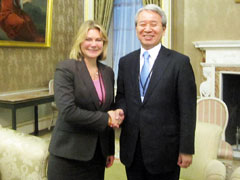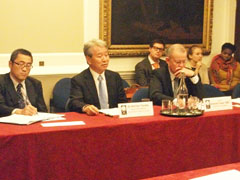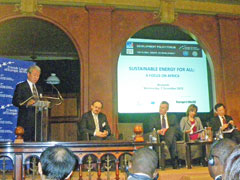Suggestions on Post-2015 at a High-level DAC Meeting
After visits to Thailand and Senegal that began on November 29, President Tanaka arrived in London on December 4. As the head of Japanese delegation at the 48th OECD Development Assistance Committee (DAC)[note 1] High Level Meeting (HLM), Tanaka joined discussions on post-2015.[note 2]
“The framework of the post-2015 development agenda should be succinct with a focus on eradicating poverty. In addition, it is important that we set a principle of human security[note 3] and allow for a perspective of sustainability, including energy conservation”, said Tanaka. The conference provided a valuable opportunity to discuss the future framework for post-2015 issues, including the post-Busan[note 4], with participants from non-DAC member countries, the private sector and civil society.
Tanaka then met with Secretary Justine Greening of the UK Department for International Development (DFID) who hosted the OECD-DAC HLM meeting, and they agreed to strengthen UK-Japanese partnership in the post-2015 and post-Busan processes.

JICA President Akihiko Tanaka (right) meets with the Secretary of State for DFID Justine Greening to confirm continuing exchanges of opinion on post-2015 and other important issues
Presentation on the role of TICAD and Japan
Next June, Japan will host the fifth Tokyo International Conference on African Development (TICAD V) in Yokohama. Tanaka took the opportunity to share his views on the importance of the conference and Japan’s role in supporting development in Africa.
At the Royal Institute of International Affairs, a British think tank commonly known as the Chatham House, Tanaka gave a presentation titled “Drivers of Japan’s Development Engagement with Africa” in which he elaborated on JICA’s cooperation to African development with a focus on TICAD V. Among the topics he touched on included responding to the changes that come with globalization, the need to reform development cooperation, and the importance of “mutual learning and joint solution discovery”[note 5] in the process of surmounting development issues. He also suggested the potential for a UK-Japan partnership in African development through TICAD V and the G8 Summit scheduled immediately afterward.

Tanaka (second from left) said, “In my visit to Senegal, I affirmed the need for economic unity in West Africa”
On December 5, Tanaka participated in the development policy forum titled “Sustainable energy for all: A focus on Africa,” held by the Friends of Europe, a think tank based in Brussels. He gave a keynote address for partners in development assistance, including the EU, the UN, the World Bank, the European Investment Bank, Germany and France. He pointed out that, “In order to make growth sustainable in Africa, mid- and long-term economic structural reform is vital for responding to the crisis such as drought and conflict. In particular, increasing energy access through public-private partnerships is an important engine for accelerating economic growth in Africa.” He further mentioned, “We hope that TICAD V will be another occasion to boost international cooperation for the development of Africa. Reflecting on the steady results of TICAD IV in 2008, we would like to emphasize the importance of economic and social transformation, regional integration and country-based approaches as a critical theme for TICAD V.”
In the ensuing panel discussion, Tanaka said that the inclusive assistance promoted by JICA on the energy front is important, as is sharing a vision and strategy with involved parties. From this perspective, he emphasized that TICAD V provides an important opportunity for a diverse range of partners to come together to develop concrete action plan in support of economic development and reducing poverty in Africa.

Tanaka (left) discusses the importance of cooperation on the energy front through public-private partnerships as “an essential element to foster growth”
Notes
- 1 . The DAC is one of the committees of the Organization for Economic Co-operation and Development (OECD), fostering co-operation with developing countries through policy guidance and inputs by, among others, multilateral institutions and experts. The DAC currently comprises 23 countries and the European Union (EU). Japan joined in 1964.
- 2 . An international development framework for beyond the 2015 deadline for achieving the Millennium Development Goals.
- 3 . According to the United Nations Commission on Human Security, human security is to protect the vital core of human lives in ways that enhance human freedoms and human fulfillment.
- 4 . In November and December 2011, an international agreement was made to achieve the commitments adopted at the “Fourth High-Level Forum on Aid Effectiveness,” known as the Busan High-Level Forum or HLF-4, held in Busan, South Korea, by a fixed deadline.
- 5 . Policy issues such as governance and social security have not been adequately overcome even by developed countries. Such issues cannot be easily coped with in developing countries by simply importing systems from today’s developed countries, whose systems might have proved to be wanting, if not completely faulty. Thus, in a world faced with multitudes of tasks with no ready-made solutions, the form of mutual learning and joint solution discovery can be an effective vehicle for development cooperation.




scroll